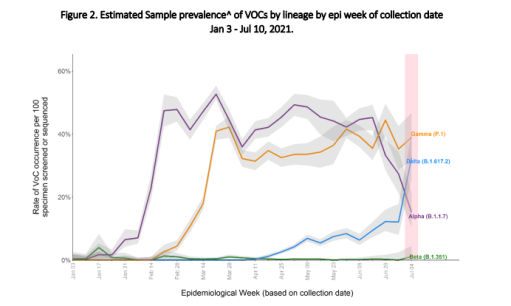The highly transmissible Delta variant makes up one third of COVID-19 cases in B.C., according to the latest data from the BC Centre for Disease Control — but a modelling expert says that number doesn’t tell the whole story.
The BCCDC’s latest variant report covers the period from July 4 to July 10, where 362 cases of COVID-19 were detected.
Thirty-three per cent of those were the Delta variant, 39 were the Gamma variant and 15 were the Alpha variant.
Read more:
Delta COVID-19 variant: A look at the risks, symptoms and impact on vaccines
The prior week, Delta made up just eight per cent of cases.
While that jump appears alarming, Sarah Otto, a UBC mathematical biologist and member of the B.C. COVID-19 modelling group, said it needs to be looked at in context.
With B.C. reporting the fewest new cases since last summer, a single new cluster can skew the numbers, she said.
“Now that in British Columbia we have very few cases, which is wonderful news, then just depending on whether one case gets out and infects a lot of people or doesn’t infect a lot of people, that that chance event cause a lot of fluctuations,” Otto said.
In absolute numbers, the increase is a jump from about 29 Delta cases to 120 cases, province-wide, over the course of a week.
Read more:
COVID-19 Delta variant now dominant strain worldwide, U.S. officials say
Otto added that the weekly variant numbers the province releases are preliminary, and subject to change as more positive test samples undergo genomic sequencing.
“Don’t pay too much attention to any one week, but look over the trends and what are we seeing and the trends,” she said.
120

B.C. Centre for Disease Control.
The Delta variant, which is significantly more contagious that the initial strain of COVID-19, has become the dominant COVID-19 strain globally, according to U.S. officials.
It has been detected in more than 100 countries, and has been spreading rapidly in the U.K. and in the U.S., where it has been attributed to a surge in hospitalizations among the unvaccinated.
That surge has prompted L.A. County to bring back its mask mandate, even among fully vaccinated residents.
It has also prompted criticism of the decision to relax COVID-19 restrictions in B.C., including the end of mandatory masks in indoor public places, as too soon.
Otto said there is no question it is also growing in B.C., but that B.C. was well positioned to fight back.
“We’ve got a couple of great things going for us. One is our very high vaccination rates. And the second is I think our community continues to be safe and do a lot of the protective measures, including keeping masks on, reducing social contacts,” she said.
READ MORE: Southeast Asia struggles to contain Delta variant amid record COVID-19 surges
“So I’m not expecting a spike in Delta, but I do think that we’re going to see a rise in number of cases. It’ll probably be very slow.”
Otto estimated the province would see a two-to-four week “warning” period before cases of the variant began to rise consistently.
She said the best defence against the rise of Delta remains raising vaccination rates and limiting social contacts.
As of Friday, 49.9 per cent of eligible British Columbians (44.8 per cent of the entire population) had been fully vaccinated.
Otto said her primary concern was that as Delta circulates in the community it will eventually hit a pocket of the population with lower vaccination rates, where it will be able to spread more quickly.
With files from Reuters

